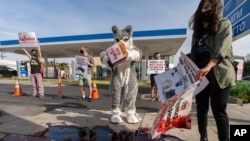The world’s most famous sled-dog race, celebrated by Alaskans for half a century but long condemned by animal-rights activists as inhumane, is losing one of its biggest corporate sponsors.
Energy giant Exxon Mobil Corp said on Friday it plans to sever ties with the Iditarod Trail Sled Dog Race after this year's 49th edition of the contest, citing economic concerns.
“After careful review of sponsorships in light of current economic conditions, we’ve decided to conclude our sponsorship of the Iditarod following the 2021 race,” Ashley Alemayehu, an Exxon Mobil spokeswoman, said in an emailed statement.
Exxon’s sponsorship focused on the race’s education program, which provides study material to schools nationwide.
People for the Ethical Treatment of Animals (PETA), a longtime Iditarod foe, claimed a victory with the decision.
“No reputable company wants to associate with a race that forces dogs to run until they collapse," PETA Executive Vice President Tracy Reiman said, calling on other sponsors to quit "this spectacle of suffering."
In response to Exxon’s decision, PETA said it will cancel an anti-Exxon ad and protest campaign set to start next week.
Animal rights activists have criticized the Iditarod for pushing its dog teams too hard in racing and training, and for subjecting its canine contestants to dangerous conditions. Five dogs died during or immediately after 2017's race.
Iditarod mushers and officials have defended their dog-care record, citing the army of volunteer veterinarians involved and extensive dog health screening conducted before each race.
Iditarod's chief operations officer, Chas St. George, suggested Exxon's withdrawal was a "short-term situation" and said he hoped the company, a sponsor since 1978, would renew ties with the race once financial difficulties posed by the pandemic abate.
"This is a time when we're all rebuilding and reassessing," St. George told Reuters. "We know that Exxon Mobil is very much a proud supporter and a proud part of the Iditarod. That will never change."
Exxon’s decision follows the loss in recent years of such longtime corporate sponsors as Alaska Airlines and Wells Fargo.
This year’s race has been sharply pared back due to the coronavirus pandemic to an 860-mile out-and-back trail instead of the traditional 1,000-mile route from Anchorage to Nome.
The race is due to start in Anchorage on March 6.





